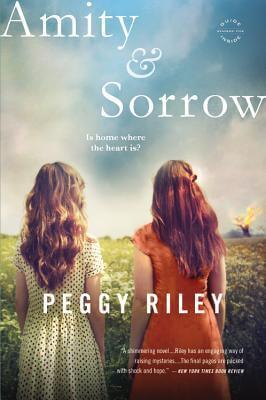What comes of children raised in polygamous cults who are then cut out—from all they know?
When I noticed this book on the shelf, I was drawn to the turquoise spine—beautiful and calming. The two girls on the front cover, in their dresses and hair down, looking on at a fire interested me. “Is home where the heart is?” the tagline asks, as if ripping my own heart out with it and forcing me to choose all over again. I read the blurb on the back, and flipped through it, considering it for a moment. I’d bought three books already, from the other Dollar Tree that day; I didn’t need another, but this one intrigued me, making me want to know more. So I bought it. I read it. Now, the story haunts my thoughts.
How can such beautiful writing tell such a sad, chilling story?
 Amity & Sorrow by Peggy Riley
Amity & Sorrow by Peggy RileyPublished by Back Bay Books on 4 February, 2014
Genre: Adult fiction, Classics, Contemporary, Cults, Fiction, Polygamy, Religious, Thriller
# pages: 336
Source: Dollar Tree
Goodreads
Rating: ★★★★★
Two sisters sit in the backseat of a car, bound at the wrists by a strip of white cloth. Their mother, Amaranth, drives for days without pause, desperate to get away from the husband she fears will follow them to the earth's end. Her daughters, Amity and Sorrow, cannot comprehend why they're fleeing or fathom what exists outside their father's polygamous compound. When an exhausted Amaranth crashes their car in rural Oklahoma, rescue arrives in the form of Bradley, a farmer not unfamiliar with loss and uncertain futures. At first mistrustful of the strange, prayerful trio, Bradley allows his abiding tolerance to get the best of him, and the four become a new kind of family.
I really liked this book.
I dislike reading books directly about abuse, but this book wasn’t like that. It was dark, but it was written so pretty it doesn’t feel dark. It’s almost poetic, if it isn’t yet.
Amity & Sorrow centers around the titular children.
It reminded me a bit of my mother’s and my relationship, but switched, in that there is a lot of tension between Amaranth and Sorrow. Of all the cult-themed movies I’ve seen, I’ve never seen any focusing on the children, too—how do the children cope and survive outside the only world, with all its false truths, they’ve ever known? Can they even survive in the real world when they’ve been taught to fight against it, to see it as treacherous, pointless nonsense? The perspective was interesting.
Meanwhile, Amity is…trying—trying to stick to the rules, but…Mother keeps breaking them—and unraveling in this outside world, albeit, slowly—from trying her first Doritos to meeting a boy who is not her brother for the first time.
I don’t recommend it if…
- You are against premarital sex, or “affairs” (I use “affair” lightly)
- You are triggered by inferences and references of incest
- You dislike reading about cults in general
I almost recommended this to my grandmother, but those three things probably would have turned her off completely, especially since I think my family is too conservative for that. I like reading about things like this, though, because I’m more likely to relate to darker stories than to light-hearted, Hallmark-y bologna. I also feel stories like this—different, things I’ve not experienced—help build empathy and better understanding, thus decreasing any ignorance. So I read them. I just try to steer clear of heavy themes of abuse.
Love this post?
Support me by subscribing to my blog and/or buying me a cuppa:
Comments on this post
Georgie
I find that I relate to darker stories a little more sometimes, too. They also don’t really have to be “dark”… but “deep”. I don’t think I have ever read a book about a cult. But I admire books that discuss sensitive topics because the taboo around some of these topics really needs to disappear. It would help people understand these things if they read something about it – even if it’s fiction.
Liz
This was my first cult book. Yeah, I guess I just associate dark with deep. ? I like reading about things seen as taboo, too, because idk. Those things need to be modernised, or at least talked about and acknowledged instead of, like, ignored and expected to go away. Ignorance does nothing but harm. ??
Leave a comment